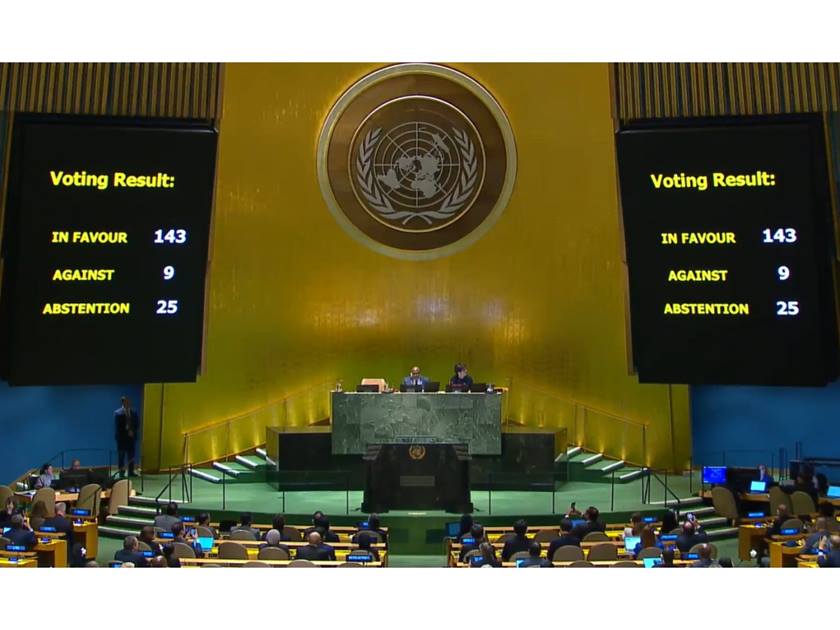Uzbekistan (including Kazakhstan, Kyrgyzstan, Tajikistan and Turkmenistan) voted in favor of a resolution recommending the UN Security Council to revisit the issue of accepting Palestine as a full member of the organization. The resolution garnered widespread support, with 143 states voting in favor on May 10.

The resolution, consisting of nine points, emphasizes the need for the Security Council to reassess Palestine's status as a full member of the UN. The document outlines specific procedural rights that Palestine would be granted as a permanent member of the General Assembly, should its full membership be accepted.
Key provisions of the resolution include granting Palestine the right to participate in discussions concerning Middle East topics, propose amendments, and make procedural proposals on behalf of a group of countries. These rights are conferred to Palestine on an exclusive basis, with the resolution emphasizing that they do not set a precedent for other observer states seeking similar privileges.
The outcome of the General Assembly vote reflects a diverse array of perspectives, with 25 countries choosing to abstain and nine, including the United States and Israel, voting against the resolution.
Palestinian Ambassador Riyad Mansour appealed to member states to support the resolution, framing it as a vote for Palestinian existence.
"A yes vote is a vote for Palestinian existence, it is not against any state," Mansour emphasized.
In contrast, the U.N. delegate of Israel, Gilad Erdan, delivered a dramatic gesture on stage, shredding a copy of the U.N. Charter. Erdan's action was accompanied by claims that including a Palestinian state would contravene the organization's charter, adding a theatrical element to the diplomatic discourse.
The resolution's fate ultimately rests on the procedural mechanisms of the U.N., with the Security Council tasked with recommending a member to the General Assembly for final approval. Unlike the Security Council, General Assembly members do not possess veto power, making the outcome of the vote subject to a two-thirds majority decision.
With over 140 U.N. member states recognizing a Palestinian state, including the West Bank and the Gaza Strip, the resolution was anticipated to pass by a significant margin. The urgency for Palestinian membership has been reignited by the recent conflict in Gaza and its subsequent humanitarian crisis, adding impetus to the diplomatic push for full U.N. recognition.
Latest update on Israel-Palestine conflict
Israeli military operations continue in Rafah and other parts of southern Gaza, prompting evacuation orders for civilians. In addition to clashes in Rafah, battles are ongoing in northern Gaza, including Zeitoun and the Jabaliya refugee camp.
The UN agency for Palestinian refugees reports that approximately 360,000 residents have fled Rafah in the past week, out of an initial population of 1.3 ,m. Aid distribution to displaced individuals is hindered by logistical challenges and diminishing supplies.
Food and essential goods have been unable to enter southern Gaza through the main border crossings for a week. The closure of the Rafah crossing, seized by Israeli troops, and ongoing conflict near the Kerem Shalom crossing have disrupted aid access.
The situation in Gaza is dire, with an estimated 1.1 mn Palestinians facing severe hunger and the region on the verge of a famine, particularly in the north. The death toll has risen significantly, surpassing 35,000, with a majority being women and children, according to local health authorities.
As of May 12, 2024, preliminary inquiries by CPJ indicated that a minimum of 97 journalists and media personnel were among the casualties of the ongoing conflict, which commenced on October 7. The total death toll has exceeded 35,000, with over 34,000 fatalities reported in Gaza and the West Bank, and 1,200 in Israel.
In December, 2023 a resolution on the Palestinian-Israeli conflict, put forth by Egypt and Mauritania, has been endorsed by the United Nations General Assembly. The resolution, backed by 153 nations, including Uzbekistan, underscored the necessity for a ceasefire. Nevertheless, objections to the resolution were voiced by 10 countries, including Israel, the USA, and Austria.
Comments (0)